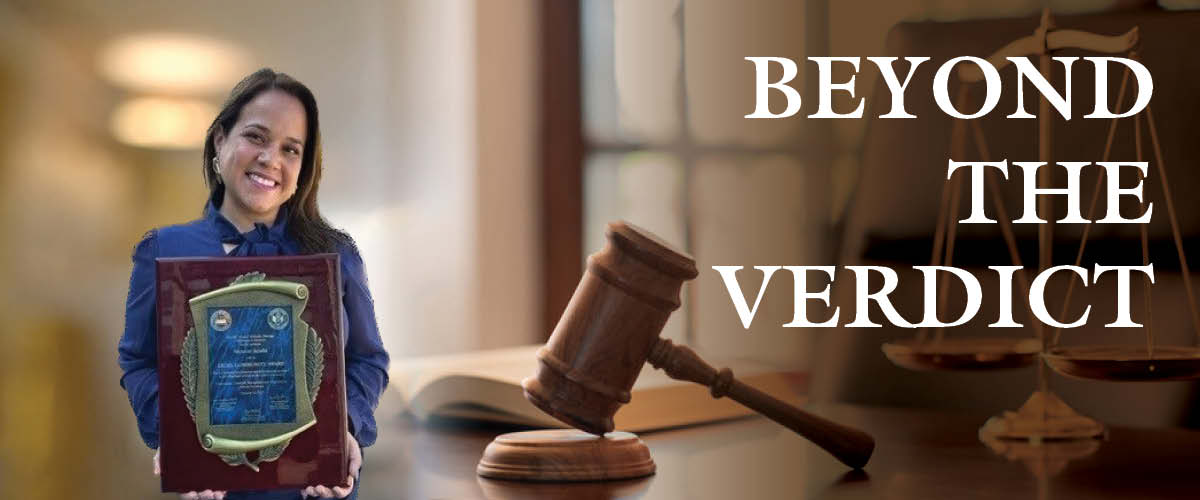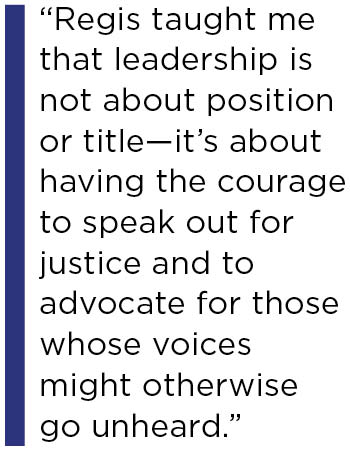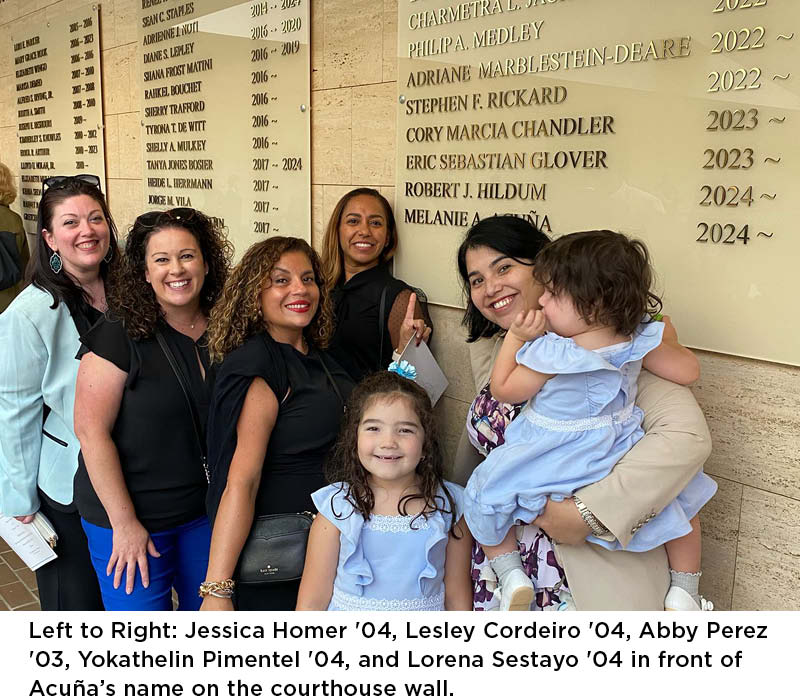
BY ASHLEY STARR
As the Honorable Melanie A. Acuña ’04 reviews her morning docket and prepares for a day of hearings in the Superior Court of the District of Columbia, she sees more than just legal proceedings ahead—she sees opportunity. Each day is a chance to make a meaningful impact on her community and uphold the principles of justice and fairness. In these moments of reflection, she often feels a full-circle connection to her days at Regis College, where her commitment to advocacy first took root.
It was on the Weston campus that she built the foundation for her legal career. Regis’ emphasis on social justice and service instilled in her the empathy and ethical framework that continue to guide her work on the bench today. What began as a young student's passion has transformed into a powerful mission: To ensure that every individual who stands before her receives not just a legal judgment, but a fair and compassionate hearing.
During her time at Regis, Acuña came to understand the power of education—it was not just a time to accumulate knowledge but to develop the values that would define her and her future. At Regis, she was surrounded by people—professors and classmates—who all believed in one another’s potential to create meaningful change. 
“Regis taught me that leadership is not about position or title—it’s about having the courage to speak out for justice and to advocate for those whose voices might otherwise go unheard,” says Acuña. “This belief that I can be both a leader and a helper simultaneously has shaped my approach to law, particularly in my commitment to a career in public interest law, where I fight for individuals who may not have the resources or opportunity to defend themselves.”
Acuña is grateful to her Regis professors, who challenged her perspectives and encouraged students to think critically in an environment that fostered a strong understanding of political science and nurtured her interest in law.
Her journey took an unexpected turn when a mentor—recognizing potential she had yet to see in herself—encouraged her to apply to the Washington Semester Program.
“Having someone believe in my potential before I could see it myself was the reason I applied to the program, and it completely changed the trajectory of my career,” says Acuña.
Acuña’s desire to pursue a career in law was solidified after living and working in Washington, D.C. for the Washington Semester Program, where she was exposed to the world of policymaking, legal systems, and political advocacy. Through this internship opportunity, Acuña worked alongside social workers at a local jail engaging with inmates in their recovery unit.
“This experience significantly changed my perspective on the criminal justice system,” says Acuña. “I learned that many of these individuals were so much more than just the charges against them.”
It was through these interactions that Acuña learned many of the inmates had faced immense struggles in their lives—from difficult upbringings to substance abuse to coping with trauma.
“I realized that their involvement in the justice system was often a result of these challenges rather than a reflection of who they truly were,” says Acuña. “This understanding laid the groundwork for my career as a public interest attorney, where I have focused on helping the most vulnerable members of society.”
Building a Career of Compassion
Acuña carried this understanding with her as she began her legal career, dedicating over a decade to serving the public good in both criminal and civil law.
In her role as a public interest attorney, she worked with elderly residents in Washington, D.C. who faced eviction or loss of housing due to financial hardship or health issues. Acuña felt a deep responsibility to advocate for their rights.
“The most rewarding part of this work was ensuring that these individuals were heard in the legal system, where they may have otherwise been overlooked,” says Acuña. “Fighting to keep them in their homes and ensuring they had a voice in their legal battles was both deeply fulfilling and personally motivating.”
Although her work is incredibly rewarding, it also comes with many challenges—navigating cases with limited resources where a resolution does not seem possible. But she pushes forward, knowing that she can change her clients’ lives—whether by advocating for their housing stability or ensuring their rights are protected in court.
“Ultimately, it is the opportunity to serve those who need it most and to help them rebuild their lives that keeps me passionate about my work,” says Acuña. “The lessons, challenges, and insights from each case have all contributed to refining my approach and perspective. I continue to learn and grow with every new case I take on."
 Becoming a Magistrate Judge was not something Acuña originally planned for. One day after a hearing, Acuña was approached by another Magistrate Judge who shared that a judgeship position was opening and, based on their experience with Acuña, they believed she would be a strong candidate for the role.
Becoming a Magistrate Judge was not something Acuña originally planned for. One day after a hearing, Acuña was approached by another Magistrate Judge who shared that a judgeship position was opening and, based on their experience with Acuña, they believed she would be a strong candidate for the role.
“I was truly speechless,” reflects Acuña. “To receive such an unexpected and meaningful recommendation was both humbling and encouraging. I took this as a sign and decided to explore the opportunity further.”
Acuña did not take this decision lightly and sought advice and guidance from other judges, who provided invaluable encouragement and helped her see how she could contribute to the judiciary in this new position.
During Acuña’s swearing-in, her Regis classmate and friend, Lorena Sestayo ’04, delivered a heartwarming speech on her behalf.
“The greatest thing Melanie has ever done is live her life in service to others,” says Sestayo. “Service requires compassion and tenacity. It’s not about showing up just once; it’s about showing up every day—and that’s what Melanie does. She’s always there, smiling and ready to serve.”
 As Acuña transitioned to her role as a magistrate judge, her experience as a public interest attorney significantly shaped her approach to the position. As an attorney, she advocated for individuals who were often marginalized and lacked a voice in the legal system, which taught her the importance of fairness, empathy, and listening carefully to every party involved.
As Acuña transitioned to her role as a magistrate judge, her experience as a public interest attorney significantly shaped her approach to the position. As an attorney, she advocated for individuals who were often marginalized and lacked a voice in the legal system, which taught her the importance of fairness, empathy, and listening carefully to every party involved.
“As a judge, I approach each case with a deep respect for the people in front of me, knowing that each person’s circumstances and experiences are unique,” explains Acuña. “I strive to ensure that all parties feel heard and treated with dignity, and I work to make decisions that are just and equitable, reflecting my commitment to public service and the pursuit of justice.”
Currently, Acuña serves in the Family Court Division, handling cases related to child abuse and neglect. While these cases can be heartbreaking and emotionally wearing , she remains focused on the positive outcomes—such as ensuring children find a permanent, loving home, whether through reunification with parents or adoption.
“Despite the challenges, the rewards of being a judge are immense,” says Acuña. “I see my position on the bench as an opportunity to make a meaningful impact on the community and to contribute to a fair and just legal system.”
Given the emotional demands of her cases, Acuña makes her well-being a priority outside of the office.
“To maintain balance, I prioritize self-care and make sure to disconnect when needed,” says Acuña. “Whether it’s spending time with friends and family, visiting a local museum, or going for walks with my dog, Honey (pictured left), I make sure to find ways to recharge mentally and physically so that I can continue to serve effectively and impartially.” 
Looking to the future, Acuña sees herself continuing in her role as a magistrate judge but is open to exploring new areas within the judiciary that would allow her to extend and expand her ability to serve.
“Regardless of the path I take, I will remain committed to serving the community and making a positive difference through my work,” says Acuña. “I will continue to carry with me the lessons Regis taught me—the importance of helping others, doing what is right, and stepping up as a leader. Its emphasis on social justice shaped my belief that the law can be a powerful tool for positive change.”